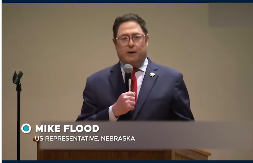Town halls across the United States have recently changed from quiet civic gatherings to intense battlegrounds where voters are vocally opposing Republican economic policies. A remarkably similar story was presented during Congressman Mike Flood’s most recent visit to Columbus, Nebraska. What started out as a standard policy update became a night filled with intense questions, unfiltered annoyance, and the loud three-word chant, “Tax the rich!”
Flood’s town hall, which was held in the auditorium of Columbus High School, was intended to explain a Republican push for a balanced budget that calls for cutting social safety nets like Social Security and Medicare. However, the well-planned presentation, which included a large screen that displayed the US debt skyrocketing to $36 trillion, backfired because voters wanted a different approach that didn’t penalize the working class. The cry of one voter, “tax the rich!” swiftly spread like a rallying cry throughout the arena, highlighting what seems to be a widening gap between populist sentiment and conservative fiscal messaging.
Mike Flood – Political Bio and Context
| Full Name | Michael John Flood |
|---|---|
| Born | February 23, 1975 |
| Political Party | Republican Party |
| Position | U.S. Representative for Nebraska’s 1st Congressional District |
| Education | Notre Dame University (BA), University of Nebraska–Lincoln (JD) |
| Professional Background | Attorney, Broadcaster, Former Speaker of the Nebraska Legislature |
| Notable Policy Focus | Fiscal conservatism, government spending reduction, pro-business legislation |
| Controversies | Support for Trump administration policies, backing DOGE (Department of Government Efficiency) |
| Official Website | flood.house.gov |
The Issue With Billionaires and Balanced Budgets
While billionaires enjoy previously unheard-of tax breaks, medium-income families in rural America frequently interpret discussions of “balancing the budget” as a means of reducing benefits. This was especially clear when Flood attempted to shift the focus away from outright criticism of Elon Musk’s power over the federal Department of Government Efficiency, which some contend serves more as a tool for corporate expansion than as a proper oversight body. The audience didn’t like it. Musk received evasive answers to questions about his $40 billion in federal funding, which led to more laughter than cheers.
Flood’s narrative ran counter to constituents’ real-world experiences by focusing on the national debt while ignoring the growing corporate subsidies and defense budgets that contribute to its inflation. Many found it dangerously naïve, if not deliberately misleading, that Musk, who has massive government contracts and vested interests, could act as an impartial auditor of government spending.
“Tax the Rich”: A Phrase Increasingly Used in Policy Discussions
The cry to “tax the rich” isn’t just sentimental rhetoric in a nation where wealth disparity has greatly increased; it’s quickly emerging as a particularly powerful abbreviation for economic justice. Constituents were questioning how and where accountability is applied, not rejecting the idea of fiscal responsibility, by bringing up this growing call for wealth redistribution.
The idea of forgoing social security and health care in order to protect tax havens for billionaires is extremely unsettling to retirees, local educators, and early-stage business owners. Flood’s supporters effectively reframed the discussion with their well-placed questions and powerful rebuttals. They weren’t avoiding accountability. They were calling for sacrifice on both sides.
An Upsurge in Political Vitality from the Bottom Up
This change is especially significant because voters in deep-red districts like Nebraska’s 1st are driving it rather than traditional progressive enclaves. It’s possible that Republican lawmakers like Flood previously anticipated praise for their tough stance on government waste. Chants, side-eyes, and scathing inquiries concerning political contributions and financial honesty have taken the place of that cheering today.
Democrats are clearly making progress by entering areas where Republicans believed they held sway thanks to strategic alliances with national leaders like Alexandria Ocasio-Cortez and Bernie Sanders. By doing this, they are expressing a sentiment that is based on actual economic realities rather than ideology. When voters themselves take center stage and start the conversation instead of just responding to it, that change is particularly noteworthy.
What Takes Place When Policy Reality and Political Theater Collide
Politics can only go so far, as demonstrated by Mike Flood’s clumsy defense of DOGE and his unwillingness to confront the “tax the rich” sentiment head-on. Voters have grown weary of pie charts and federal jargon in the post-pandemic, inflation-weary economy. They seek responses that are realistic, sympathetic, and pertinent to the facts.
More than partisan loyalty, this type of involvement—or lack thereof—will probably define political careers in the years to come. Debates about economic justice are increasingly taking place at town halls. Ignoring the message of the crowd won’t make it go away, but it will make it louder, clearer, and noticeably more coordinated, if Mike Flood’s experience is any guide.
That change could be especially upsetting for Republicans who are counting on inaction or disengagement. It might be the political windfall Democrats have been waiting for, if they are paying close attention. In any case, it’s becoming evident that “tax the rich” is more than just a catchphrase. It’s a campaign.


